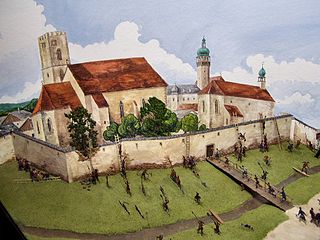See also
Surname list
This page lists people with the surname Frankenburg. If an internal link intending to refer to a specific person led you to this page, you may wish to change that link by adding the person's given name(s) to the link.
Frankenburg is German for "Frankish castle" and may refer to:
Places:
Castles or castle ruins:
People:
Limburg or Limbourg may refer to:
Berg may refer to:
Stein may refer to:
Hof or HOF may refer to:
Falkenstein or Falckenstein may refer to:
Schönberg may refer to:
Haag is a common Germanic place-name and personal name, which originally meant "hedge" or "fence", hence "enclosed area", such as a fenced hamlet, park or wood. Also Hagen, Hägen.
Wolfsberg may refer to:
Silberberg is German for "Silver Mountain" or "Silver Hill" and may refer to:

"Barbarossa city" is a nickname for German cities that the Staufer Emperor Frederick Barbarossa stayed in or near for some time. The cities usually mentioned include Sinzig, Kaiserslautern, Gelnhausen, Altenburg, Bad Frankenhausen, but Annweiler am Trifels, Bad Wimpfen, Eberbach and Waiblingen consider themselves as such as well.
Schaumburg is a district in Lower Saxony, Germany. Schauenburg is a municipality in Hesse
Heiligenberg is a municipality and a village in the Bodensee district, Baden-Württemberg, Germany.

Frankenburg am Hausruck is a municipality in the district of Vöcklabruck in the Austrian state of Upper Austria.
Lehen may refer to:

The Upper Austrian peasant war of 1626 was a rebellion led by farmers whose goal was to free Upper Austria from Bavarian rule. The motive was an escalation of the Bavarian Electorate's attempt to press the country into the Catholic faith at the time of the Thirty Years' War.

The Frankenburg is a natural monument with the ruins of a rock castle in the county of Südliche Weinstraße in the German state of Rhineland-Palatinate. It lies above the Modenbach valley on a rocky outcrop of the Frankenberg called the Frankenfelsen and was built to guard the road opposite Meistersel Castle.
Schlossberg Castle may refer to the following:
Odenbach is a village in the county of Kusel, Rhineland-Palatinate.
The Frankenburg Dice Game in 1625 was the prelude to the Upper Austrian Peasants' War and took place against the historical background of the Counter-Reformation. The event took place in Haushamerfeld in Pfaffing, which at that time belonged to the county of Frankenburg. The name "dice game" originated in the 19th century. The dice in the local coat of arms Pfaffing symbolise this event.

Frein Castle is located in the Frein division of the municipality of Frankenburg am Hausruck in the Vöcklabruck district of Upper Austria.